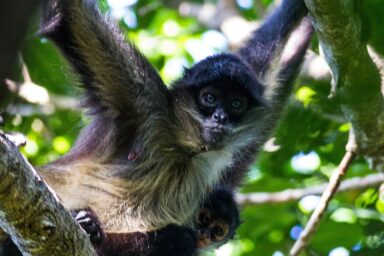PICKS are stories from many sources, selected by our editors or recommended by our readers because they are important, surprising, troubling, enlightening, inspiring, or amusing. They appear on our site and in our daily newsletter. Please send suggested articles, videos, podcasts, etc. to picks@whowhatwhy.org.
Blue Corn and Melons: Meet the Seed Keepers Reviving Ancient, Resilient Crops (Maria)
The author writes, “For the past decade, [Indigenous seed keeper and farmer Aaron] Lowden, 34, has worked to restore traditional crops and farming practices in Acoma [Pueblo in New Mexico]. As program director for Ancestral Lands, a nonprofit that supports land stewardship in Indigenous communities, he reintroduced traditional Acoma crops into the community and created a bank of 57 arid-adapted seeds native to the region. His work is part of a broader movement to build food and seed sovereignty on tribal lands amidst staggering global biodiversity losses created by the modern agricultural system and growing food insecurities caused by climate crisis.”
Solomon Islands Becomes Unlikely Epicenter of U.S.-China Competition (Sean)
From Axios: “A U.S. delegation led by the top White House and State Department officials for Asia is heading this week to the Solomon Islands, a South Pacific archipelago with fewer than 700,000 inhabitants that has unexpectedly become ground zero for U.S.-China competition. Why it matters: A planned security agreement negotiated with Beijing, which could allow China’s navy to dock warships on the islands, sent the U.S. and its allies in Australia and New Zealand into diplomatic hyperdrive. The U.S. officials heading to the islands will make the case that the U.S., not China, ‘can provide security, prosperity and peace for the region,’ an administration official told Axios on Monday.”
The Slime Machine Targeting Dozens of Biden Nominees (DonkeyHotey)
The author writes, “During the autos-da-fé that now pass for Supreme Court confirmation hearings in the U.S. Senate, it’s common for supporters of a nominee to dismiss attacks from the opposing party as mere partisanship. But, during the recent hearings for Ketanji Brown Jackson, Andrew C. McCarthy—a Republican former federal prosecutor and a prominent legal commentator at National Review—took the unusual step of denouncing an attack from his own side. When Republican senators, including Josh Hawley and Marsha Blackburn, began accusing Jackson of having been a dangerously lenient judge toward sex offenders, McCarthy wrote a column calling the charge ‘meritless to the point of demagoguery.’ He didn’t like Jackson’s judicial philosophy, but ‘the implication that she has a soft spot for ‘sex offenders’ who ‘prey on children’ . . . is a smear.’”
The End of Presidential Debates (Reader Jim)
From The Atlantic: “The Marvel entertainment company fused its superhero movies into a ‘Marvel Cinematic Universe’ so involute that only the most devoted fans can make sense of it. Only those conversant with the pro-Trump right’s internal myths and legends can decipher the Republican National Committee’s vote on Thursday to boycott the Commission on Presidential Debates in 2024.”
Why Russia Likely Won’t Win the Fight in Ukraine’s Cities (Reader Steve)
The author writes, “Here is where the war has gone — and probably will continue to go — wrong for Russia. Urban warfare is the most complex, hardest type of warfare for even the best-trained and equipped military in the world. Despite all the proclamations of its modernization and expertise, Russia has shown its shortcomings. Russian troops look more like the Soviet army that bumbled into Afghanistan in the 1980s than the force that took over Crimea in 2014. In Ukraine, the resistance is stiffer than in Crimea, but the inability of Russia to dominate the cyber, electronic warfare and information fronts also has been pivotal.”
Turkey: Flamingos Bring Colors to the Lake Eber (Carina)
From Euronews: “Lake Eber, one of Afyonkarahisar’s (Turkey) most important natural wealth, was colored by flamingos, whose numbers have recently increased. With an area of 125 square kilometers, Lake Eber lies at an altitude of 967 meters between the Emir Mountains and the Sultan Mountains, within the borders of the Bolvadin district. It is also an important place for bird watchers as it is one of the most frequent destinations for these migratory birds.”



